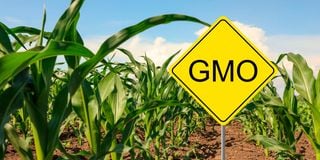Let collapse of Séralini, LSK cases revive GMO march

A paper BY Giles Eric Séralini discrediting GMOs was used by several countries, including Kenya and India, to ban or halt GM crops.
The October 17 dismissal of a defamation case in France against journalists who rubbished research by Giles Eric Séralini discrediting genetically modified organisms (GMO) raises questions about the persistence of his findings in the Kenyan policy landscape, where they continue to overshadow discussions on the topic.
The verdict comes long after the main findings were debunked and the paper itself retracted. Besides, the Environment Court on October 12 threw out a case filed by the Law Society of Kenya (LSK) challenging an October 2022 lifting of a 10-year ban on GM crops, saying the government had taken appropriate measures to regulate their use.
Mr Séralini, the scientist behind the decade-long GMO ban in Kenya, had sued three French journalists for calling his work—which notoriously tied rats with grotesque tumors to GMOs—’fraudulent’ but the judges found in favour of the trio.
In 2019, Séralini, a French biologist at the University of Caen, sued Mac Lesggy, Patrick Cohen and Geraldine Woessner for defamation after they described the findings of his controversial study on rats fed on GMO corn and Roundup herbicide as fraudulent and misleading. Cohen, for instance, referred on TV to the controversial paper as “one of the worst scientific deceptions of the past ten years”.
Séralini then filed a complaint for defamation in the Judicial Court of Paris, demanding €50,000 from each of the journalists in damages and claiming that his health had suffered in the controversy.
But referring in particular to Woessner’s use of the term “fraudulent” in reference to the paper , the court ruled that she had relied on “an abundant factual basis” which justified “using this semantics, which should not be understood in the strict sense of scientific fraud but rather as the criticism of acts contravening the ethics that should surround the production and media coverage of scientific work”.
Scientists were jubilant on hearing the news of the acquittal. Channa Prakash, professor of plant molecular genetics at Tuskegee University in the United States, tweeted: “Let’s call fraud a fraud!” He added that the paper was used by several countries, including Kenya and India, to ban or halt GM crops.
Although the flaws in the original 2012 publication were immediately evident to many scientists and later led to it being retracted by the journal Food & Chemical Toxicology, Séralini’s paper caused enormous media and public furore as it contained gory images of rats with gigantic tumours.
The Kenyan government proceeded to ban GMO imports, a ban only recently lifted by President William Ruto’s government but immediately mired in court cases filed by anti-GMO campaign groups.
Prof Richard Oduor, Kenya University Biotech Consortium (Kubico) chair and Acting Registrar, Research, Innovation and Outreach at Kenyatta University, said the case was bound to fail. “He [Séralini] should apologise publicly.” Dr Paul Chege, a crop biotechnologist, said the paper was a perfect example of flawed science but “had a powerful influence on crop biotech policies in the Global South”.
Dr Susan Moenga, a biotech researcher at NuCicer who works on chickpeas, welcomed the verdict. She said Kenya is taking “a leading step in genetic engineering adoption, allowing innovation in our space and context supported by rational regulatory frameworks”. And why not?
- Dr Oria, PhD ( [email protected] @Nyuka_Bel ) is LEAD Fellow, Prof Janine Erler Research Group, Biotech Research and Innovation Centre, University of Copenhagen, Denmark. Mr Lynas ( [email protected] @mark_lynas ), adviser to the former President of the Maldives, Mohamed Nasheed, is the research and climate lead with the Alliance for Science.



